
Partners in Diagnosis: ChatGPT, a Mother’s Intuition, and a Doctor’s Expertise with Courtney Hofmann and Dr. Holly Gilmer
2024/11/20

NEJM AI Grand Rounds
C
Courtney Hofmann
D
Dr. Holly Gilmer
Courtney Hofmann讲述了儿子长达三年的求医经历,尽管他们拥有良好的教育背景和医疗保险,但儿子的病症始终未能得到确诊。她最终选择将儿子的所有病历信息输入ChatGPT,并从中获得了脊髓栓系综合征的可能诊断。她强调了在医疗系统中,病人常常面临被忽视、被误诊的困境,并呼吁家长们积极利用AI工具和病友互助群获取信息和支持。
Holly Gilmer医生详细解释了脊髓栓系综合征的症状、体征和诊断难点,并确认了Courtney儿子的诊断。她认为ChatGPT的价值在于提供尽可能多的可能性,而不是直接给出诊断,最终仍需医生进行鉴别诊断。她也相信AI将在未来深刻改变医疗的各个方面,医生也需要适应这种变化。
Deep Dive
Courtney Hofmann recounts her son's three-year struggle with undiagnosed chronic pain and how using ChatGPT led to the diagnosis of tethered cord syndrome.
- Courtney's son saw 17 doctors over three years without a diagnosis.
- ChatGPT suggested tethered cord syndrome after Courtney input her son's medical records.
- Courtney cross-referenced ChatGPT's suggestions with online parent communities and medical literature.
Shownotes Transcript
In this episode of NEJM AI Grand Rounds, hosts Raj Manrai and Andy Beam interview Courtney Hofmann), a mother whose use of ChatGPT led to her son’s diagnosis of tethered cord syndrome after seeing 17 doctors over three years, and Dr. Holly Gilmer), the pediatric neurosurgeon who confirmed and treated the condition. The conversation explores how AI helped bridge diagnostic gaps, systemic health care challenges that led to missed diagnoses, and the evolving role of AI in patient advocacy and medical practice. The episode highlights the importance of combining AI insights with human medical expertise, while discussing both the potential and limitations of AI in health care.
Transcript.)